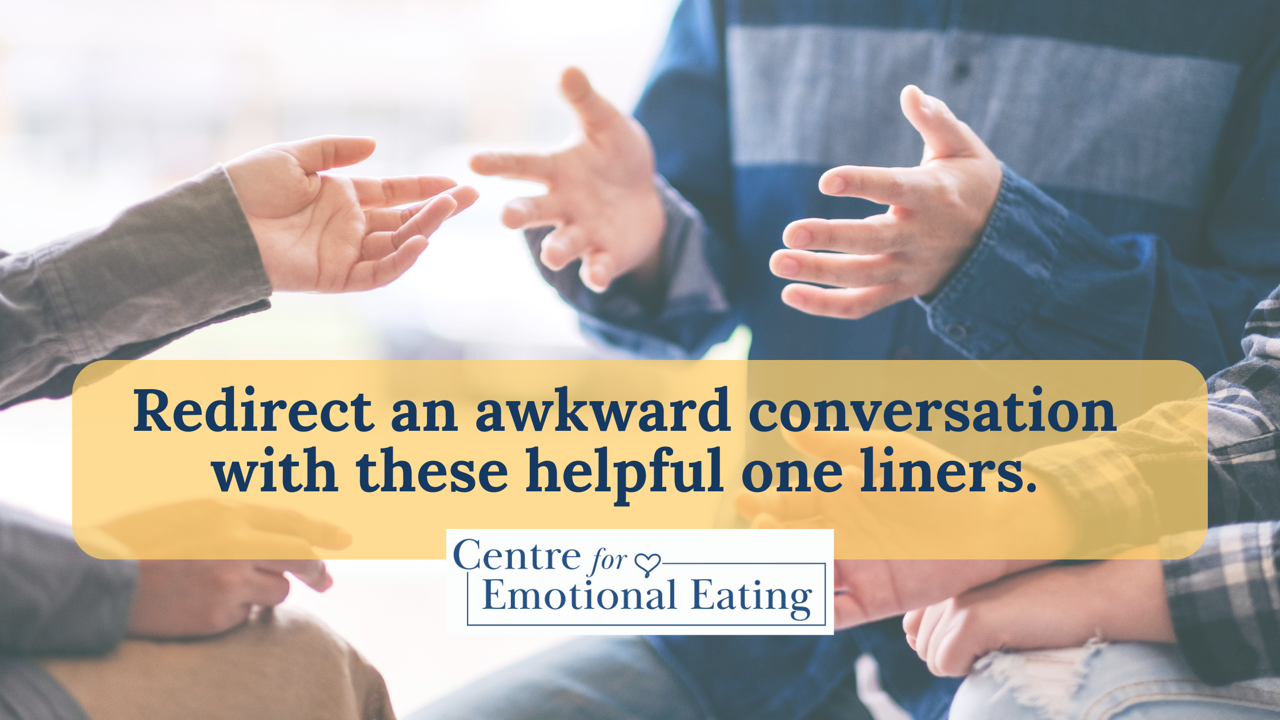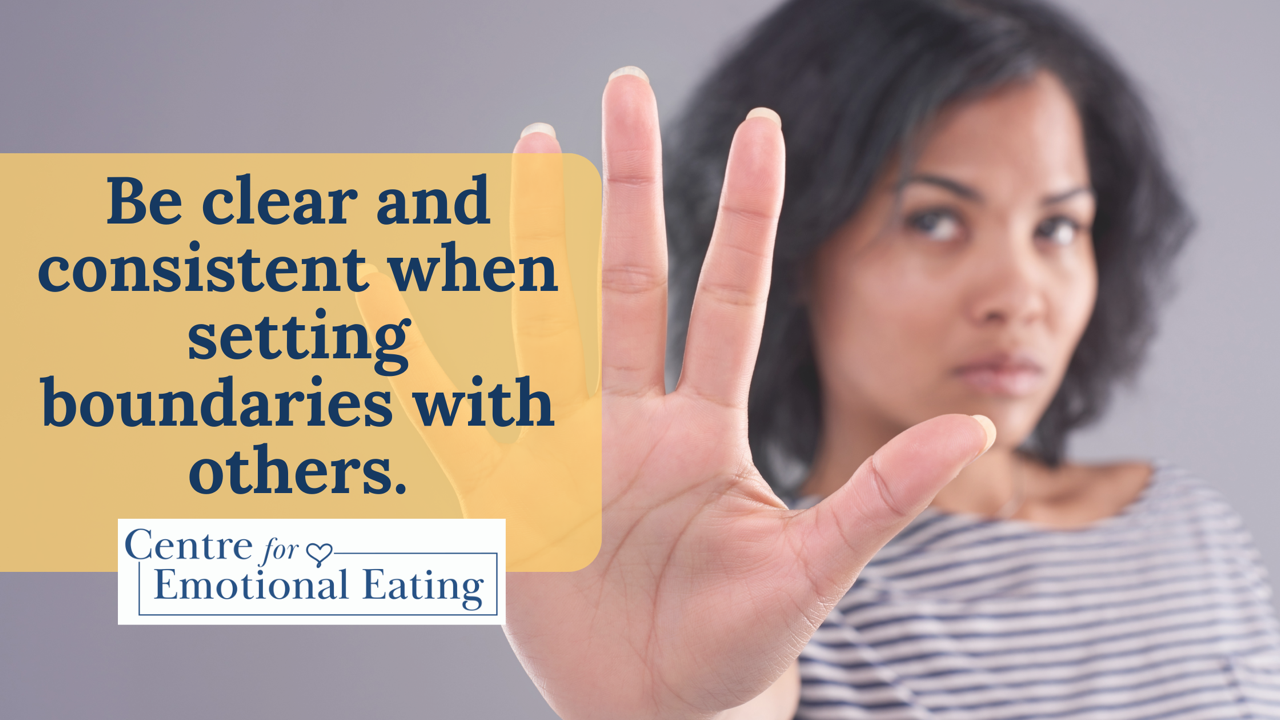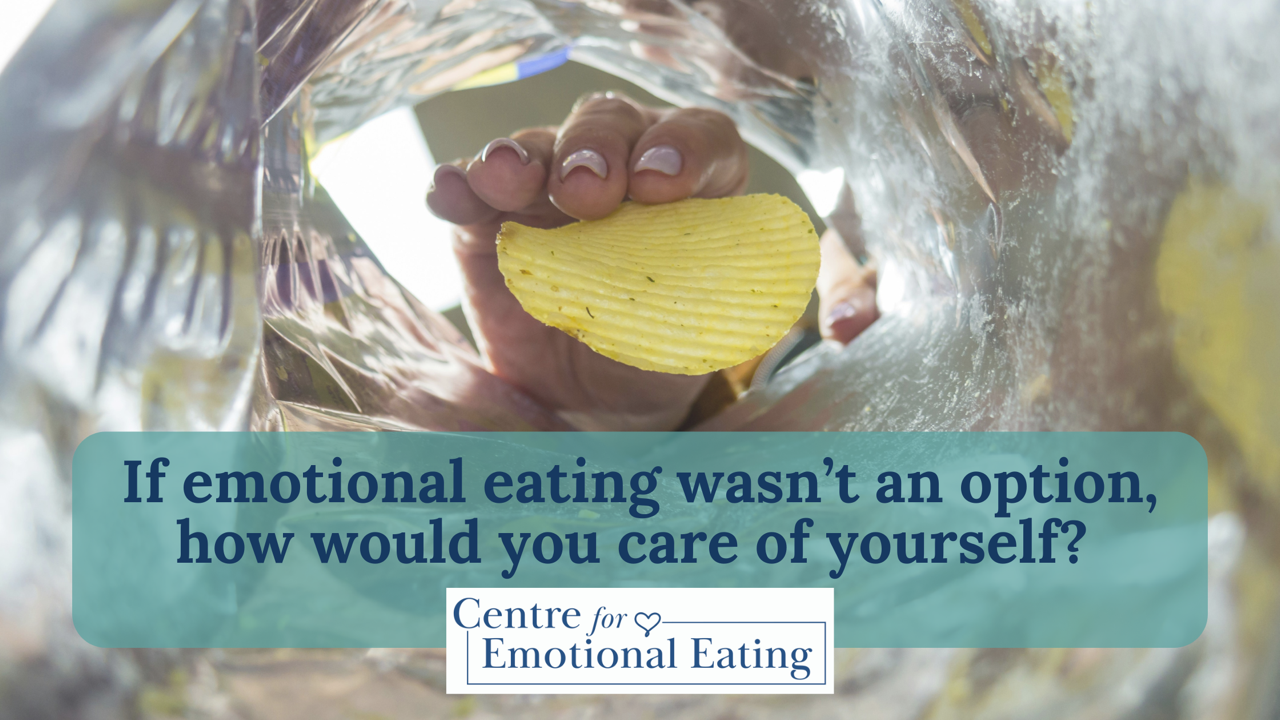BLOG
Find support not just for emotional eating, but all aspects of your well-being.
Real Scripts You Can Use this Holiday Season

Social gatherings can be stressful at the best of times: they require your time, energy, money, and you have to figure out what to wear. Add in the expectation that someone will comment on your weight, what you’re eating, how you vote, or how you choose to live your life and the anxiety can build as soon as the event is on your calendar.
If you are already dreading a few get-togethers on your calendar, below are some helpful scripts you can use to shut down unwanted comments and criticism. Read through and choose which ones might be helpful to you. Feel free to bookmark this blog post or take a screen shot on your phone so you can come back to this anytime you need to feel empowered to redirect an uncomfortable conversation.
Try being warm and polite:
- “It’s the holiday season, let’s focus on the positive. What are you excited about right now?”
- “Let’s keep things light today. Tell me something wonderful that’s going on with you lately?”
Try being gentle but clear:
- “That is ...
How to Set Personal Boundaries

Setting boundaries with other people can feel very challenging. It pushes against our desire to keep the peace, challenge those we love, out of fear of rejection. But they are an essential part of maintaining your well-being and healthy relationships.
Benefits of Boundaries
Your boundaries are personal to you—they’re the guidelines you set to protect your body, mind, energy, and lifestyle. That’s a pretty powerful thing. For example, setting boundaries with others can include how frequently or quickly you respond to calls and texts, saying “no” when you don’t have time or interest in something, or pushing back on critical comments.
While you might feel uncomfortable to set boundaries, doing so can support your mental health, financial stability, help you feel more confident, and even create healthier relationships. Often others will respect you for knowing what you are and aren’t comfortable with, and stick with it.
While you may need to communicate your boundaries to others, you d...
Client Insight: “It felt scary when therapy started to change how I saw myself and others.”

Doing the work in therapy often comes with challenging the stories you’ve always told yourself. Over time we solidify ideas about ourselves, our relationships, and the world around us. This can sound like:
“I’m broken.”
“I’ll always be an emotional eater.”
“My mom did the best she could.”
But as you face these narratives about yourself, you’ll start to find the wiggle room, the space to start re-thinking how you see yourself and what that means for your identity. This can feel destabilizing! It is scary if you always thought of yourself or those in your life one way, only to unpack that things are different that they first appeared. It can feel easier to stick with the familiar way you’ve always understood your family and friends, and even yourself.
While this experience is uncomfortable, it is also a great sign that therapy is getting to the root of your experiences. Let’s flip the script: changing how you see the world is like taking off a pair of tinted sunglasses.
Let’s try t...
Finding Some Comfort While Grieving

We’re told that grief has stages that we move through, that there is an end to the process. But the truth is much more complex than that. While its intensity can lessen over time, there are often triggers, sometimes unexpected ones, that bring up feelings in new and painful ways.
And while grief is a common experience, it is still a topic many feel uncomfortable talking about. For example, if you’ve lost someone you love, others in your community might not know how to talk to you about it even if you want to keep the conversation—and memory—of your person present. Others often worry they are making you feel worse you by asking how you’re coping.
If you are struggling with grief right now, we want you to know there is no right or wrong way to move through it. To start, reach out to someone you trust or get support from a therapist to help guide you. You might be surprised how freeing it feels to have a safe space to cry or rage. This can create a release of emotions that you don’t hav...
Aligning Your Values with Your Relationships

When it comes to supporting our mental health, we tend to start with the big things: the quality of our sleep, what we eat, going to therapy, taking medication. This can lead to more confidence and awareness which are powerful tools! But you might also begin to notice that working on yourself has shifted your relationships with others in ways you didn’t expect.
As you implement changes in your life and your perspective shifts, you might find you grow annoyed or feel critical towards others you usually have felt ok around. You might even feel like you can’t show or talk about who it is you’re becoming. Your immediate reaction might be to blame yourself, piling on the guilt that you’re a “bad friend” or a “bad person” because you’re thinking about others differently, even critically.
If you dig past those uncomfortable feelings, you’ll notice that it isn’t about them, but that getting clearer on your values (and setting boundaries that go along with them) means you no longer align with...
Client Insight: “My emotional eating led to weight loss—it was celebrated, but I felt awful.”

It’s true that we never really know what someone else is going through. We’ve covered in another post how not all emotional eaters are overweight, and sometimes emotional eating can lead to weight loss in an unexpected way.
For some clients, when emotions run high, they feel the need to control their eating as a way of trying to control their lives. For them it feels like the only thing they have power over is what they put in their mouth—not their kid’s tantrum, their boss’s feedback, or their partner’s attitude.
While in this scenario there is an absence of food, instead of a binge, it is still emotional eating because a person’s eating pattern has changed in response to emotional experiences. For example, this can look like telling yourself you’re too busy to eat, believing you’re not worthy of nourishment, not having motivation to cook and eat, or feeling a physical surge of anxiety that makes your stomach queasy. Experiencing these actions long enough can lead to weight loss.
T...
How to Explain Emotional Eating to Others

There may come a time on your journey where you feel like you want to explain how and why you emotionally eat to those you trust. You might feel in your gut that you would benefit from opening up and sharing your experiences. But emotional eating is complex, where should you even begin? We’ve got a number of concrete examples below to help guide you!
We want to be clear: you don’t have to explain or justify your feelings or actions to others. This post is intended to support those who feel like speaking about their experiences to someone they trust will help support them on their journey. Remember: no one gets to comment on your body (even if it is weight loss).
A good first step is to check in with your person and see if they have capacity for you to share. This can set the tone of your interaction by encouraging limiting distractions, finding a quiet space, and making sure they are in a good mental place to support you.
Start by explaining the link between emotions and food, that ...
How to Plan for a Death Anniversary

The anniversary of the death of a loved one comes with its own unique challenges. Unlike birthdays or weddings, the day your loved one passed is a focal point for your grief and can bring all the feelings of loss right back to the surface.
While you might expect the day to be difficult, you might find engaging in some sort of memorial—big or small—can be a lovely way to honour their memory and support your own mental health.
There are so many ways you can honour your loved one! To get you thinking about what might be helpful for you, here’s a list of 10 things you can do to remember your person. You can either choose to do something by yourself or with others—the choice is completely up to you and there is no right or wrong way to mourn.
- Hold space to let out the emotions—cry, rage, whatever! Sometimes a sad playlist or movie will allow the tears to flow, other times you might want to sweat it out at the gym.
- Visit their final resting place. Bring flowers, read a poem, or simpl ...
Client Insight: “I spoke up when it felt therapy had stopped working for me—and it made all the difference!”

There are so many different types of therapy, it can be overwhelming when you’re starting out. While there are definitely things to consider when choosing a therapist, identifying when a method of therapy isn’t working is a powerful way to make progress on your mental health journey.
What does it look like when therapy isn’t working for you? It is important to remember that your ‘aim’ in therapy can be a moving goal post. For example, you might start therapy to manage your depression but after dealing with the immediate symptoms you and your therapist might begin focusing on your childhood experiences that are informing your current behaviour. This is normal!
But you shouldn’t be leaving your sessions feeling frustrated. While a therapy ‘hangover’ is expected, you should feel at least slight relief at being heard and supported through a session. It can be helpful to journal or just jot down how you feel after a session to keep track of your progress and new coping tools you’ve learnt...
5 Tips If You Dread Going to the Doctor

Going in to see your doctor might be something that fills you with dread. While you may be all-too familiar with this feeling, there is a name for what you might be experiencing when you step into a clinic: weight bias.
This is defined as negative views, usually based on serotypes or misconceptions, towards people who are overweight or obese.
Everyday people who are overweight face discrimination, from the size of seats on a plane to critical looks and comments from others. There are prominent beliefs that plus size or obese individuals are somehow lesser than, aren’t considered beautiful, and should be blamed (and shamed) for the size of their waistline. This bias also exists in healthcare.
While there have been strides made in providing training to nurses and doctors that provide primary care, it can still be daunting to go to the doctor for something that *seems* simple like an annual checkup. Here are five things to keep in mind that might help you feel empowered when gathering...


